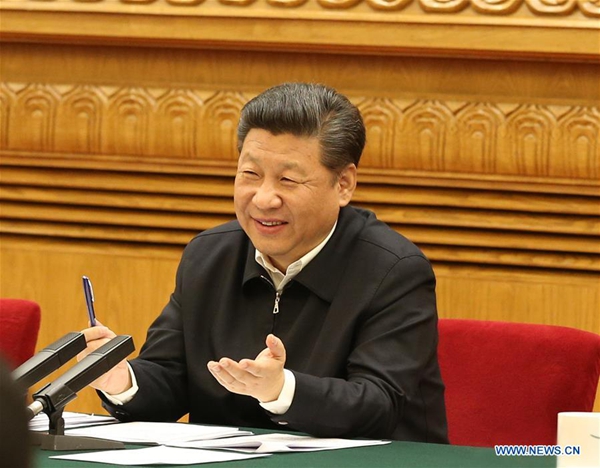Internet security - Xi Jinping grasps the nettle
- By Tim Collard
 0 Comment(s)
0 Comment(s) Print
Print E-mail China.org.cn, May 3, 2016
E-mail China.org.cn, May 3, 2016
|
|
|
Chinese President Xi Jinping, also head of the central internet security and informatization leading group, presides over a symposium on cyberspace security and informatization in Beijing, capital of China, April 19, 2016. [Xinhua/Ma Zhancheng] |
In China, internet security has become an issue of increasing importance in recent years, as the country is faced with the rapid cyber-networking of the whole world. This of course presents huge opportunities for a faster and more efficient flow of information, which is of great economic benefit to all countries. But the president has not evaded the main problem for China in increased capacity for information flows, which consists of the associated security risks. President Xi called for more work to be put into a comprehensive identification and elimination of the risks to online security. He told the relevant authorities to establish unified and effective mechanisms to report risks and share best practices, setting up a nationwide trouble shooting network.
One widespread problem is that of unauthorized access to data, or "hacking." According to the president, the "correct outlook on cyber security" would involve the establishment of a comprehensive system to protect information infrastructure in sensitive industries, including finance, energy, telecommunications and transportation. These problems are common to all countries - hacking in the financial industry is a severe problem right across the West - and everyone will sympathize with China in tackling them. We all may learn something.
Another issue addressed was the need for full coordination between government agencies and the private sector. It will be of little use that official information sources are tightly protected, if it remains possible to make use of private networks to get behind the defences.
President Xi mentioned that there will inevitably be competition between the internet industries of major countries. He claimed that the Chinese proposals on cyber-sovereignty and a common global cyberspace community have won the support of the majority of countries. This clearly makes sense, as we all face the same problems. But there are also security issues involved in this nexus between competition and cooperation. China must up her game, said the president, concerning the research of core internet technology, which he identified as being the key to China's internet development. If the most up-to-date technology were in the hands of other countries that would be a significant danger, the president commented. "Other countries holding the key is our biggest threat."
Another sensitive issue which the president did not shy away from addressing was the management of China's internal internet. He said firmly that blocking internet access is not the right way to manage the internet, and that China had no wish to "shut her door to the world."
In fact he said that officials should take note of what is being said on the internet and on social media, understand and engage with concerns expressed, and acquire an accurate assessment of the state of public opinion. Chinese web users come from all backgrounds and all parts of China's huge territory, and offer a huge variety of experiences and opinions. President Xi made special reference to ensuring that internet access would be accessible to the poorer elements of the population, so that their views do not get ignored; this could also help with the marketing of their agricultural products and with their children's education.
The president said that, with such a large population, there would inevitably be some inaccurate and unorthodox opinions. This was natural, and the full engagement of official media managers in addressing the people's concerns will help to clarify public misconceptions and address public grievances. It would also be necessary to monitor unhealthy modes of expression and ensure a clean atmosphere in cyberspace. Likewise, the free expression of opinion would not cover slanders, false rumors, crimes and violations of the Constitution and the law. In this context, President Xi said that foreign internet organizations were welcome to operate in China, provided that they abided by the relevant Chinese laws and regulations.
This forthright approach, not shying away from complex questions like the balance between the benefits of liberalization and the requirements of security, is characteristic of the way the president and the leadership have gone about implementing the reform program. No aspect of national life is to be exempted from the need for reform, streamlining and the absolute need to keep on top of technological developments. Again, the president did not refrain from expressing criticism where necessary, saying that Chinese internet enterprises had not succeeded in achieving the same degree of mutual technological cooperation that the big U.S. firms have established, and this explained why China was still lagging behind in many ways. But, from now on, all energies will be bent towards improving this situation, and the government will remain clearly at the head of development, as in all other aspects of the reform program.
The writer is a columnist with China.org.cn. For more information please visit:
http://www.shenbo75.com/opinion/timcollard.htm
Opinion articles reflect the views of their authors, not necessarily those of China.org.cn.






